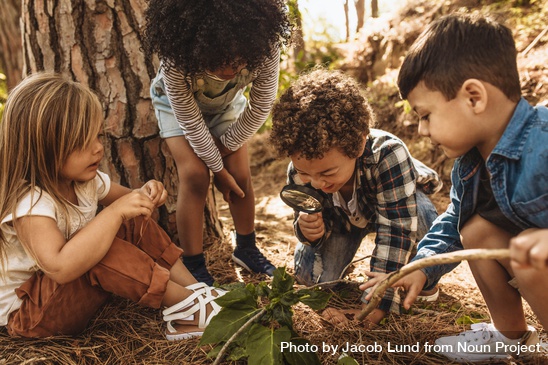October 12, 2023
By: Maya Bowen and Megan Gunnar
When the Covid-19 pandemic hit the United States in the spring of 2020, stringent social distancing policies were put into place, and many schools were closed or instituted limited enrollment to reduce the risk of transmission. Many preschool-aged children, who would normally be entering preschool and interacting with groups of peers for the first time, were instead spending an increased amount of time at home with limited exposure to children outside their family. Throughout the 2020-2021 pandemic academic year, there was variation in the amount of peer and other adult exposure children experienced, as some children were able to return to preschool and childcare, some stayed home, and others were able to spend time outside in neighborhood play groups.
In the fall of 2021, the Child Development Laboratory School (CDLS) half-day program at the University of Minnesota reopened to full capacity. [They had operated at half capacity and only outdoors during the 2020-2021 academic year.] We collaborated with the lab school to study how the variation in social experience during the pandemic might influence children’s adjustment when returning to or starting preschool. The CDLS half-day program had a total of 74 children between the ages of 2-5 years old enrolled (69% male). We set up five GoPro 360 cameras on the three CDLS playgrounds. With these cameras, we were able to film 2 hours of each class’s free play sessions on the 1st and 11th day of class. The videos were coded by a team of trained undergraduate research assistants who observed children’s moods, behaviors, and interactions. From these observations, we calculated an adjustment score which reflected how much of the time the child was busily engaged in play during free play and how interactive and coordinated their play was with peers.
Parents reported a lot of variation in peer contact during the pandemic. Some of the children had been in the CDLS half day program (previously known as the Shirley Moore Preschool) during the 2020-2021 school year, some had been in other types of childcare, some played with kids in their neighborhood, and some had very little contact with children outside their own families. We noted how much peer contact children had and examined contact with infants (most had none), peers (children within a year or so of their age), and school-aged children. Contact with people outside the family increased in the spring of 2021 and into the summer of 2021 (when children could play together outside), but at the beginning of the 2021 school-year some children were interacting with other peers for the first time in a year, and others were renewing their experiences in the preschool after summer break. This gave us a great opportunity to correlate experiences during 2020-2021 with adjustment to school in September of 2021.
The take home message from this research is that peer experience was more important for preschool adjustment than interaction with school-aged children or adults. By the end of our observation period (the children’s 11th day of class), children with more peer experience in the last year were more engaged and more integrated with other children. We had teachers rate how adjusted the children were which supported the same finding we found. Peer experience mattered over and above whether that experience was in the CDLS or not. It also mattered more than the children’s temperament. We thought that shy children might be more negatively affected by not having social experiences during the pandemic, but that was not the case. Shyness was related to adjustment (according to teacher ratings), but even outgoing children struggled to adjust in those first weeks if they had little to no experience with kids their own age during the pandemic year.
We only observed the first few weeks of class. We do not know if children “caught up” to adjusting to preschool or whether we will see signs of the pandemic in the behavior of children who were preschool-aged during the pandemic. We can be confident that high quality peer group experiences, such as those provided by the CDLS, may be a great antidote to missing out on peer experiences for a year during the formative preschool years.


